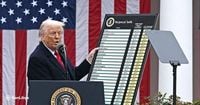The United States has announced a significant exemption for smartphones, computers, and various electronics from the retaliatory tariffs imposed earlier this month by former President Donald Trump. According to the U.S. Customs and Border Protection agency, these exemptions are intended to ease the financial burden on American consumers and businesses reliant on technology imports.
On April 11, 2025, the Customs agency issued a notification detailing that all products correctly classified under specific categories would be exempt from these tariffs. This list includes approximately 20 different electronic items, such as laptops, tablets, smartphones, modems, external hard drives, flash drives, displays, transistors, and other semiconductor devices.
The exemption comes at a critical time, as Trump had previously signed an executive order on April 2, imposing a base tariff rate of 10% on imports from various countries, calculated based on the U.S. trade deficit with each nation. By April 9, the tariffs were applied to 57 countries, with the aim of achieving a trade balance rather than a deficit.
As part of the new measures, the Customs agency emphasized that importers of the listed products must report secondary classifications to claim the exemption from the retaliatory tariffs. The agency stated, "All products classified correctly under the mentioned items will be exempt from the reciprocal tariffs." This move is expected to benefit major tech companies like Apple, Dell, and HP, which rely heavily on imports for their operations.
According to reports from Reuters, the exemptions are retroactive, starting from April 5, 2025. This retroactive application means that any products imported after this date will not incur the additional tariffs, allowing businesses to resume normal operations without the added financial strain.
The American Chamber of Commerce has expressed support for these exemptions, highlighting the need for a balanced approach to trade that does not unduly harm American consumers or businesses. The Chamber noted that the tariffs could have had a detrimental effect on technology companies that manufacture a significant portion of their products in China.
Furthermore, the Customs agency has warned about potential contamination issues with certain electronic components. It stated, "All contaminated products in a valid form within the documented chips will be strengthened from the original factory drawings." This statement reflects ongoing concerns about the integrity of imported electronics and the need for stringent quality controls.
In light of the escalating trade tensions, the U.S. has also imposed additional tariffs on Chinese goods, reaching as high as 125%. This escalation has led to reciprocal measures from China, which has retaliated with similar tariffs on American products. The current situation underscores the complexities of international trade and the need for diplomatic negotiations to resolve these disputes.
Moreover, President Trump has indicated that more than 75 countries have not taken retaliatory measures and have requested negotiations. As a result, the basic tariffs of 10% will be applied for 90 days to all countries except China, as the U.S. seeks to address trade imbalances.
The exemptions for electronics, particularly smartphones and computers, are seen as a crucial step in alleviating the pressures faced by consumers and businesses alike. As technology continues to play a central role in daily life, the government's decision to exclude these essential items from tariffs is likely to be welcomed by many.
As the situation evolves, the U.S. Customs and Border Protection agency will continue to monitor the impact of these tariffs and exemptions on the market. Stakeholders are encouraged to stay informed about any further changes that may arise as negotiations with other countries progress.
In summary, the U.S. government's decision to exempt key electronics from tariffs reflects a strategic move to balance trade relations while supporting American consumers and businesses during a challenging economic period. The ongoing trade war with China and other nations poses significant challenges, but these exemptions may provide a temporary relief as discussions continue.





